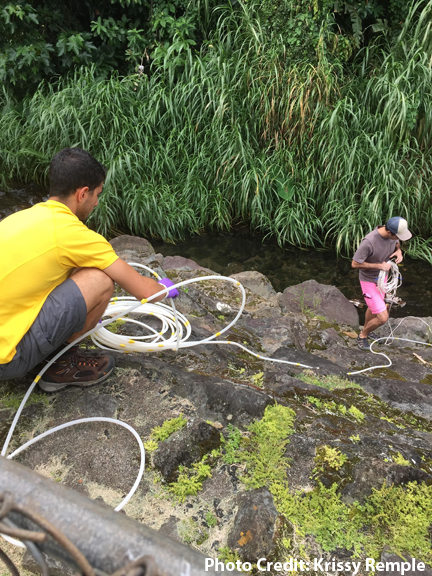Collaborative investigation of hydraulic and geochemical connectivity between wastewaters and land-use and the oceanic waters of Kāneʻohe Bay, Oʻahu
PRINCIPAL INVESTIGATOR: Craig Glenn
Co-INVESTIGATORS: Henrietta Dulai, Aly El-Kadi, Craig Nelson, Celia Smith, Robert Whittier
Graduate Fellow: Michael Mathioudakis

The risk that sewage effluent released to the environment poses to human health and the environment is well documented, and human-health risks and environmental impacts of terrestrial wastewater disposal are of global concern. The ecological impacts of anthropogenic loading are becoming increasingly clear. High system density or improper function can lead to contamination of aquifers and adjacent surface waters by nutrients, pathogens, and pharmaceuticals. Thus, on-site sewage disposal systems (OSDS) are a substantial threat to groundwater quality and the second most frequently reported cause of contaminated groundwater. Developing a complete understanding of the environmental and health risks of wastewater leakage from OSDS thus remains a fundamental and critical concern for the State of Hawaiʻi. Our goal is to assess the hydraulic and geochemical connectivity between OSDS wastewaters and other land use and the oceanic waters of Kāneʻohe Bay, Oʻahu, with particular focus in the Kahaluʻu area. To achieve this goal, our objective is to investigate the flow paths of contaminant transport from known occurrences of OSDS by integrating remote sensing and field studies of submarine and subterranean groundwater, stream, and shoreline nutrient loads and N-stable isotope of waters and algae and microbial genomic fingerprinting into advanced watershed and groundwater dissolved solute transport models. New results of this research and the wealth of data generated will advance the state of science and provide solutions for water pressing problems. Most importantly, we feel, is that the State of Hawaiʻi will greatly benefit from the hydrologic research for deigning remediation strategy of a critically important OSDS problem.
Watch a podcast on this project here.

